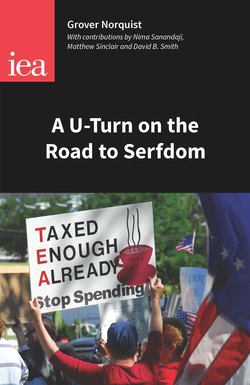Читать книгу A U-Turn on the Road to Serfdom - Grover Norquist Glenn - Страница 6
На сайте Литреса книга снята с продажи.
Summary
Оглавление•There is a growing coalition of people in the US who hold a strong view that they would like the government to ‘leave us alone’. The coalition includes home-schoolers, those who run small businesses and taxpayers. These groups do not want special favours from government and their priorities are very different from each other. However, the coalition is united in its desire for the government not to interfere in their lives.
•There is a coalition opposed to the ‘leave us alone’ coalition. This is the ‘takings coalition’ that views the proper role of government as taking money from others and giving it to them. All tax increases feed the ‘takings coalition’ and increase its strength and appetite.
•However, if taxes cannot be increased, the interest groups that wish to increase spending on their own favourite causes will only be able to do so if spending is decreased on other programmes – choices will have to be made and the ‘takings coalition’ will become fractious.
•Because there is a significant degree of fiscal decentralisation in the US, the states can lead the way in reducing government spending, taxation and regulation.
•In the US, states can copy each other’s successful policies. States are, in a sense, in competition with each other. Those that follow policies that discourage business will see an exodus to states that have lower taxes and regulatory burdens. This is already happening.
•Currently, a majority of people live in states that have governors and legislatures that would be sympathetic to an agenda of lower taxation and less regulation. This provides reason for optimism.
•At the federal level, the Ryan budget plan provides
hope that there will be a significant reduction in government spending compared with current projections. The plan would lead to lower and simpler taxes and the decentralisation of responsibility for welfare programmes. Ponzi Medicare and pensions schemes would be replaced by funded, individually controlled, defined contribution plans. If nothing changes in the US, spending at the federal level
alone will increase to around 40 per cent of GDP
from around 20 per cent today. The Ryan budget plan would bring the spending ratio back down to below
20 per cent.
•In order to maintain – and increase – momentum towards a free economy, we need to create favourable demographic trends. This can be done through radical reforms that give families control over education, pensions and welfare. When such reforms are carried out, those affected will tend to support economic policies that involve a less substantial role for the state.
•Detailed analysis of government spending around the world shows that there have been very rapid increases in the share of national income taken by the government. Since Ronald Reagan’s election as president in 1980, the proportion of national income spent by the US government at various levels has increased by around one third to 40 per cent. This increase will have had a significant impact on economic growth. Indeed, if government spending had remained at the same proportion of national income as in 1960, the evidence suggests that national income in the US would now be around 70 per cent higher than its current level.
•There are differences between European countries and the US. In particular, the UK has a very centralised fiscal system that does not provide the same opportunities for competition as the US federal system. However, there are similarities between Europe and the US when it comes to the dynamics of reform. There are a number of examples in Europe – for example, in health and education reform in Scandinavia – of reform leading to interest groups developing that are averse to reversing policy changes and, indeed, that promote further radical policy change.
